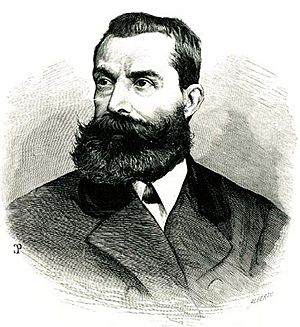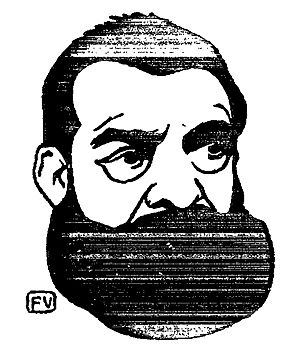João de Deus de Nogueira Ramos facts for kids
Quick facts for kids
João de Deus Ramos
|
|
|---|---|

João de Deus Ramos (from O Ocidente, 1878).
|
|
| Born | 8 March 1830 São Bartolomeu de Messines,
Silves, Portugal |
| Died | January 11, 1896 (aged 65) |
| Occupation | Poet |
João de Deus de Nogueira Ramos (March 8, 1830 – January 11, 1896), usually called João de Deus, was a well-known Portuguese poet. He was also a pedagogue (someone who teaches) and an editor. João de Deus cared a lot about education in Portugal. He wrote a very famous teaching book called Cartilha Maternal (1876). This book was used to teach the Portuguese language across the country for many years.
Contents
His Life Story
João de Deus was born in São Bartolomeu de Messines, a town in Algarve, Portugal. His parents were Pedro José Ramos and Isabel Gertrudes Martins.
He started studying law at the University of Coimbra. However, he didn't finish his degree. Instead, he stayed in Coimbra and spent his time writing poems. These poems became popular among students and teachers.
Early Career and Politics
João de Deus was very careful with his writing. He didn't publish anything until 1855. His first poem published on its own was A Lata in 1860.
In 1862, he moved to Beja. There, he became the editor of O Bejense, a main newspaper in the Alentejo region. Four years later, he edited another newspaper called Folha do Sul.
He was elected as a deputy (a type of representative in government) for Silves in 1868. Even though he was a deputy, he didn't follow any political party. He acted on his own. When new elections came the next year, he chose not to run again. This showed his strong and independent character.
Important Works
In the year he was elected deputy, his friend José António Garcia Blanco collected many of his poems. These were published as Flores do campo. Later, another collection, Ramo de flores (1869), was added. Many people consider this collection to be João de Deus's best work.
He also wrote some short plays and translated other works. He married Guilhermina das Mercês Battaglia and they had two sons.
Focus on Education
In the years that followed, João de Deus became very interested in education. His book Cartilha maternal (1876) shared his ideas on teaching. He had studied the methods of famous educators like Pestalozzi and Fröbel.
His work in education became very important to him. It led him to write many letters and other publications about teaching. He also translated a book about children's duties to their parents.
Later Years and Legacy
In his final years, João de Deus returned to writing more religious poems. He died in Lisbon on January 11, 1896. He was given a public funeral.
He was first buried in the National Pantheon, a special place for important Portuguese figures. Later, his remains were moved to the Church of Santa Engrácia, which is the new National Pantheon. His writings and letters were published after his death by Teófilo Braga.
His Poetry
João de Deus is one of the most widely read and admired Portuguese poets. Only Camões and perhaps Almeida Garrett are more famous. However, João de Deus didn't care much about fame. He didn't even keep copies of his own poems. Others had to collect them from different places.
He wasn't known for deep philosophical ideas. His poems often focused on a few themes. Sometimes, his poems had small mistakes in rhyme or rhythm. Yet, people loved his work.
His Poetic Style
João de Deus looked up to Camões, especially Camões's love poems and sonnets. His own poems often expressed tender feelings.
A writer named Teófilo Braga described five stages in João de Deus's poetry. These included early imitations, joyful poems, love poems, sad poems, and religious poems.
João de Deus is best known as a "singer of love." His poems like Rachel, Marina, Adeus, and Meu casto lírio are full of gentle feelings. They have a simple, honest style that makes them special.
He avoided fancy words or showing off in his poetry. His main style was sweet and pure. Even though his poems were soft, they were never overly emotional. He had a unique way of putting feelings into delicate music. If he had focused only on poetry and refined his skills more, he could have reached even greater heights as a poet.
See also
 In Spanish: João de Deus Ramos para niños
In Spanish: João de Deus Ramos para niños
 | Misty Copeland |
 | Raven Wilkinson |
 | Debra Austin |
 | Aesha Ash |


